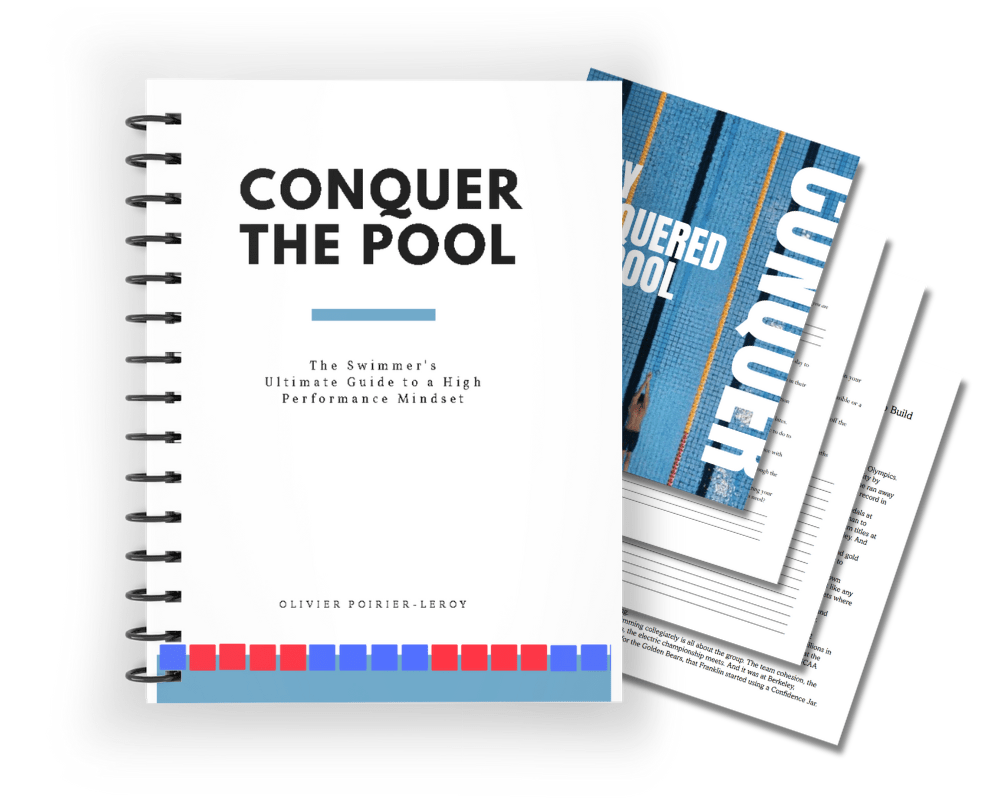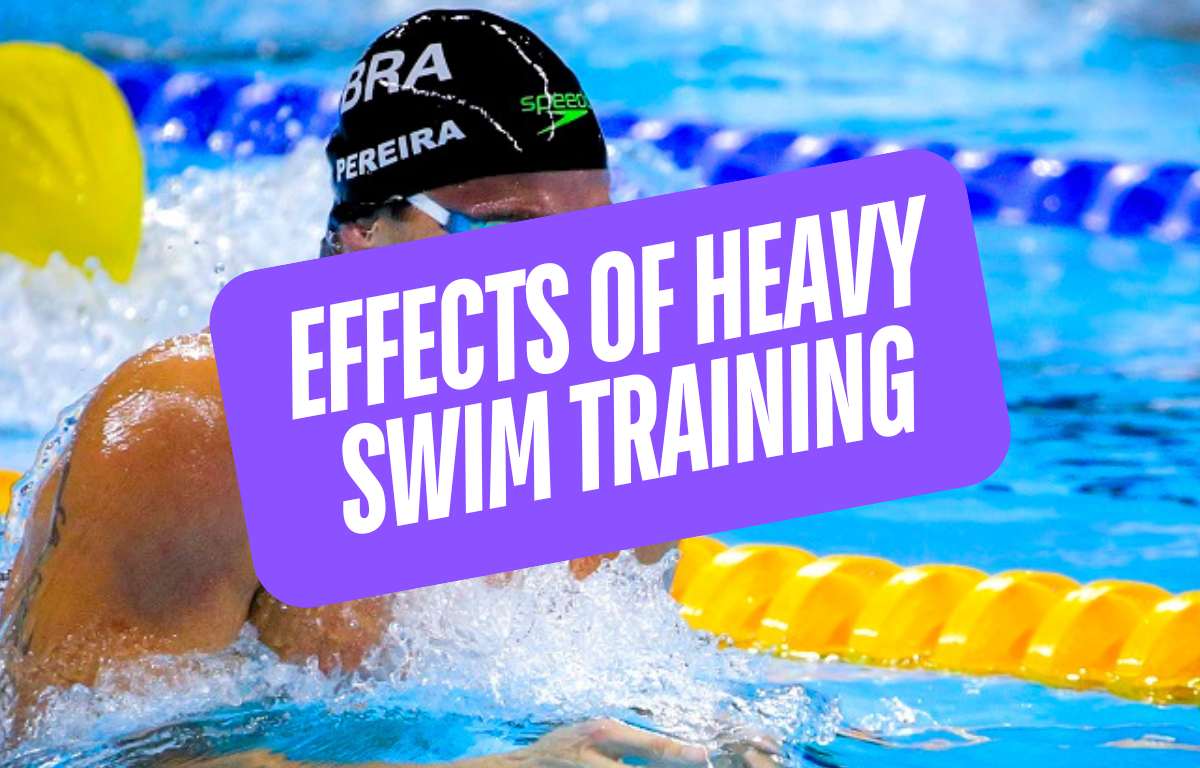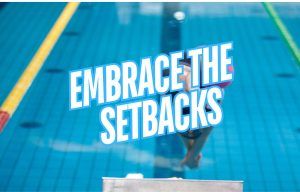Heavy swim training does more than just leave your muscles sore and achey. It also increases stress and reduces confidence. Here’s what you need to know.
Ever get the “hard training blues”?
It’s that feeling of low confidence and stress as you’re logging your heaviest sets of the season.
Even though you are working your butt off, making incremental progress towards your goals, and putting in WORK, you can’t help but notice feeling jittery and low.
Turns out, the “hard training blues” aren’t uncommon.
Even with some of the fastest swimmers on the planet.
How Heavy Training Affects Your Mindset
A study by Zhou et al (2024) published in Frontiers in Psychology tracked the confidence and anxiety of a group of elite swimmers through different phases of a swim season.
From the beginning of the season (to set a baseline), during the heaviest training of the year, and to the moments right before the Big Meet.
(The Big Meet in this case was the 2023 World Aquatics Championships in Fukuoka.)
Researchers asked swimmers to rate their anxiety and self-confidence at each phase. There were some obvious insights:
Swimmers who managed anxiety performed best. Swimmers who managed anxiety—they were alert and excited but the nerves didn’t overwhelm them—excelled. By reframing anxiety as excitement, swimmers can excel under pressure.
Self-confidence matters. Swimmers with stronger self-confidence scores handled anxiety better, especially when the lights were brightest.
Some swimmers are more naturally anxious than others. This is called trait anxiety. These swimmers are more prone to spikes in stress when training load is high.
Experienced swimmers worried more. Veteran swimmers who had been around for a while registered higher anxiety ratings across the season. This is likely because they felt like they had more at stake versus younger up-and-coming swimmers, which added pressure as the big meets rolled around.
But there was one insight that jumped off the page:
Heavy Training = Heavy Anxiety
While we expect to see higher anxiety scores closer to competition (the Big Meet still scored highest in terms of cognitive and somatic anxiety), there was also a significant jump in anxiety during heavy weeks of training.
Just how much?
Anxiety levels jumped by 30-42% during peak training compared to the baseline.
Somatic (physical) anxiety was almost as high during hard training as right before Worlds. And the self-confidence scores were in the 4s both during heavy training and right before World Championships.
Here’s a table comparing anxiety and confidence scores at each phase of the season:
| Phase | Cognitive Anxiety | Somatic Anxiety | Self‑Confidence |
| Baseline (T0) | 5.00 ± 1.75 | 5.25 ± 2.17 | 6.75 ± 1.62 |
| Heavy Training (T1) | 6.55 ± 1.00 | 7.45 ± 1.61 | 4.85 ± 1.46 |
| World Championships (T2) | 8.15 ± 1.39 | 8.10 ± 1.21 | 4.15 ± 1.27 |
| Asian Games (T3) | 7.00 ± 1.75 | 6.90 ± 1.21 | 7.40 ± 1.82 |
Why Hard Training Tanks Self-Confidence
This would seem counter-intuitive, as the “hard work” is what we are using to sculpt the performance of our dreams when we step up onto the block.
Here’s why hard training affected anxiety and self-confidence so much:
Body is stressed. Hard training triggers the sympathetic nervous system. Yup, flight-or-flight mode. Heart rate and tension increased, and this naturally cranks up somatic anxiety (feeling tense, jittery).
The stakes are high. Swimmers know that these blocks of heavy training—weeks on weeks of grinding out the meters—are crucial for peak performance on race day. Swimmers know the big training blocks are important, so they feel if they aren’t producing during this stretch, their season end goals are at risk. This increases cognitive anxiety (worry, rumination, doubt).
Fatigue eats away at confidence. As your body wears you down, your mind can too. The study found that self-confidence scores dipped during heavy training, removing a key buffer against anxiety.
One swimmer who participated in the survey summed it up:
“These intense training sessions are really exhausting and frustrating, but they are necessary to win and improve. If I skip them, I cannot swim well, and that makes me anxious. It’s a vicious cycle.”
The Bottom Line
Swim training is hard. The early mornings. Extra-long Saturday sessions. Grinding out the sessions to sharpen a performance that you can be proud of on race day.
But heavy training doesn’t just test your muscles and willpower, but of how well you can manage recovery to keep confidence humming for when you need it most.
Smart swimmers and coaches know that recovery and mental reset days aren’t a luxury, but are part of the puzzle for success.
Which means:
- Stay on top of getting lots of sleep for optimal recovery
- Eat well and stay hydrated to fuel physical recovery
- Mentally reset when away from the pool (e.g. leave swimming at the pool)
- Know that the “hard training blues” comes for us all
So work hard at the pool.
And recover even harder.
Take your mental game to the next level.
Swimmers frustrated with underwhelming performances on race day and want to conquer their mindset will love Conquer the Pool: The Swimmer’s Ultimate Guide to a High-Performance Mindset.
Written with the feedback of 200+ Olympians, NCAA champions, and head coaches, the book is the complete blueprint for an unbeatable mindset in practice and training.
From learning how to build a killer pre-race routine to everything you’ll ever need to master pre-race nerves, Conquer the Pool gives swimmers the tools to swim with total confidence on race day.













